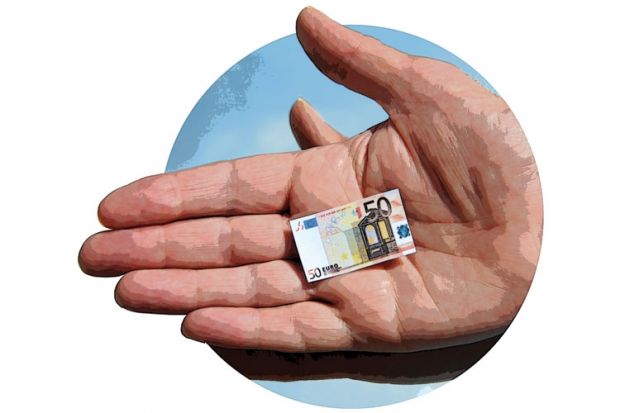Europe is in crisis. That is the official premise of an-EU funded research call for the social sciences and the humanities, “Europe in a changing world”. The umbrella organisation is called Horizon 2020, and it will provide nearly €80 billion (£66.5 billion) in “research and innovation” funding between now and 2020. Hard sciences, life sciences and technology will get the lion’s share, of course; but the wee lambs in the social sciences and the humanities are proposed to get up to 17 per cent of the total.
So a lot of money is involved. A lot of bureaucracy is involved as well. The funding call is extremely complicated.
It is asking social scientists and humanities scholars to come up with nothing less than a solution to the crisis in Europe. The problem begins with economics, of course. Not only is Europe suffering from massive economic inequality between regions – stagnation in many countries and recession conditions in others – but it does not seem to know how to govern itself economically, or how to put itself on a sure footing for “growth”. The funding call is also worried about pessimism and indifference among its constituents, about getting the young off to a good start in life and, perhaps above all, about restoring a sense of hope to the European project.
It is easy for a scholar to resent the thrust of “Europe in a changing world”. It locks the scholar into a large body of assumptions that the scholar might wish to question. In economic matters, the funding call is locked into a paradigm that uneasily combines neoliberal dogma with the humanitarian aspirations of the welfare state. In cultural matters, it is locked into a model where differences are infinitely to be celebrated, even while, socially and economically, everyone is supposed to behave the same. The idea of “innovation” is elevated to the status of a religious concept, as are “resilience” and “sustainability”.
The type of solutions the project is looking for would seem to be the kind of policy proposals generated by thinktanks, technocrats and political hacks rather than academics. The project assumes that a certain power structure, with certain key personnel, is already in place in Europe and ought to remain that way. It wants a great deal of change, so that Europe will be more resilient and sustainable. But it also wants everything to remain the same. It wants, it seems, not science but advice. And it wants the advice to be nice. I saw no suggestion that researchers ought to look into breaking up the big banks, shutting down tax havens, forgiving the poorer countries their debts, or democratising the European Commission.
The challenge to intellectuals to try to reshape Europe while remaining true to their principles will nevertheless prove, I hope, to be irresistible. For years, academics have been whining about injustices and dysfunctions within Europe while business leaders and politicians have been making policy and leading us into, well, a crisis. Now academics, working on their own terms, independently, are being asked to come up with solutions. Maybe it’s time for us to stop whining.
Register to continue
Why register?
- Registration is free and only takes a moment
- Once registered, you can read 3 articles a month
- Sign up for our newsletter
Subscribe
Or subscribe for unlimited access to:
- Unlimited access to news, views, insights & reviews
- Digital editions
- Digital access to THE’s university and college rankings analysis
Already registered or a current subscriber? Login

